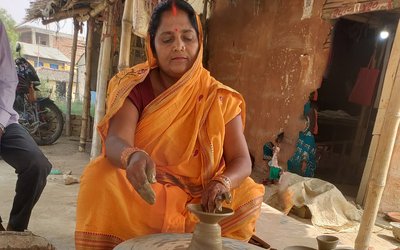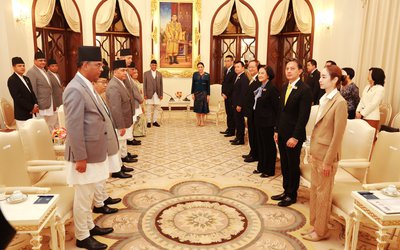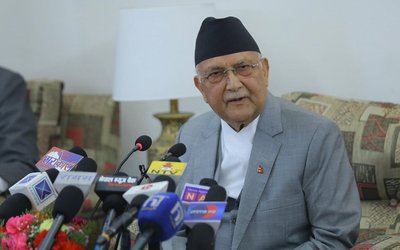More on Opinion





Differences still persist amongst the major political parties and Nepalese scholars as to what form of government Nepal should opt for. The Constituent Assembly is in dilemma. A reformed governance system, whether it be of parliamentary model or presidential model, or a combination of the two (mixed system) ?Which one ? Debates continue but political parties have very little time left to make a sensible and unbiased decision on it.
An agreement among all, at least in principle, has however beenmade in favour of a democratic system backed up by the principles of rule of law, human rights, separation of powers, independence of the judiciary, and inclusive representative institutions. No compromise on this !Commitments of the prevailing political forces of the country in these democratic valuesare reflected in the Interim Constitution (2007) and the Comprehensive Peace Agreement (CPA), which has received a constitutional space as Schedule 4. Federalism has now been added through the first amendment of the Interim Constitution that would determine the vertical form of government structure to bring the various units of governmentclosure to the people, both in theory and practice as the notion suggests. Hence, federalism,if properly designed and handled, is an added impetus of participatory democratic governance to strengthen the polity through the principles of shared rule, self-rule and unity in diversity. But a clear linkage between the form of government and federalism has to be established at the outset if a system has to work. This is however totally missing.
Except authoritarianism, no democratic system ever fails unless it has been wrongly designed and improperly implemented. The problem lies with the political leadership and parties, and other stakeholders and hidden beneficiareis, whose commitments and failures are equally responsible for the success or non-functioning of a democratic system. Multiparty polity and press freedom, or freedom of association, in itself are never wrong in a democratic system. These are in fact bedrocks of democracy. But why do parties break up and wrong dissemination of information cause social anarchy and disorder ? We cannot blame multiparty system for the excesses of specific political party and authoritarian behaviour of the political leaders. The Constituent Assembly itself does not have anything to do with its failure to produce a constitution in time; it the structure and the failure of the actors and other stakeholders that are basically responsible for non-performance of the CA. The same is the case with the system of governance also.
In the world, there are tentatively forty threecountries with full presidential system with no Prime Minister, the president acting as both Head of State and Government without accountability to the elected House, such as SA, Brazil, Liberia and Afghanistan. Twenty three countries have powerful presidents as Heads of the State with nominal powers shared with Prime Ministers, such as Armenia and Belarus. Semi presidential systems like France, Guyana and exist in about twenty seven countries. Whereas parliamentary system with a Prime Minister elected from the House as executive chief works in more than eighty five countries in the world, including parliamentary republic like Finland and India, and constitutional monarchies like Sweden, Denmark and Norway. Directorial system of parliamentary model like Switzerland and absolute monarchies, even theocracies like Iran, are not countedhere. All systems are working in their own way, and the country specific situations are the determining factor for the success and failure of a democratic system. Hence, what are the country specific situationsthat demand a specific form of government inNepal ?That we should look for. Needs and specific characteristics of a Country should in fact decide as to what we should opt for, not anyone’s whims and emotions. Justifications must be placed before the people by CA and political advocates, and it should be convincing and practical, and conceptually sound.
Not only political parties, including UCPN-Maoist, even scholars like Professor LokrajBaral and Professor Surya Subedi, once advocates of parliamentary system, have recently been found tilting towards Presidential System primarily on the grounds of stability and failed experiment of parliamentary system for the past seven decades. Some leaders, such as JN Khanal and NarahariAcharya, are even arguing in favour of directly elected Prime Minister, once unsuccessfully tried in Israel.
Dr.RohanIdrishina, a constitutional lawyer from Sri Lanka and currently associated with UNDP in Nepal, has been heard several times sharing very negative experiences of Sri Lanka, and advising Nepalese not to jump for any untested system that may plunge the country into an authoritarian ditch. So was the experience of well-known Professors of Comparative Constitutional Law from Kenya, Dr.Yash Pal Ghai and Jill Cottrell, who strongly feel, based on their global and specifically African experiences, that Nepal is not a right candidate for Presidential system. Nepal never experimented parliamentary system in a proper way except for eighteen months during late fifties, hence there is no question of failure of the parliamentary experience in Nepal. According to them, as was suggested by Professor Idrishina, it is wrong to suggest that Presidential system offers stability. Professor Ghai cites Africa as a worst case where out of fifty countries, all countries except four, are presidential and they all authoritarian and unstable. Compared to them, only four parliamentary states in Africa more stable. So does the experiences of Latin America indicate. Moreover, according to the World Bank study, comparatively countries with parliamentary system are less corrupt, as are indicated by New Zealand, Norway, Denmark, Finland and Singapore.
Scholars suggest, there are ways to reform system, rather than experimenting one system after another. Germany has devised mechanisms to prevent frequent change of governments by putting a rider on vote of no confidence motion. Frequent dissolution of parliament can easily be checked by preventing any dissolution with requirements of parliamentary approval or defining a minimum time gap. One Canadian scholar suggested: don’t forget that you are a country with immense diversities and you have decided to go for a federal system. How can you accommodate the diverse groups without parliamentary devices ? Can a single directly elected President for a fixed period represent the aspirations of diverse group ? Perhaps, familiarity of the parliamentary system may be easily understood by the common people who are atuned to the parliamentary model even if that had never been duly implemented before under a free and fair electoral process. The Challenge of social inclusion is perhaps not the cake of Presidential system.
Whatever be the system we choose, it has direct relevance to the federal mechanism we devise. Equally important is the electoral process, and guarantee of inclusivity and fairness. Hence, if we eventually decide to experiment, rightly or wrongly, a presidential or a mixed system, then nature of federal legislature, provincial and local governments, and judicial structure and public administration will have to be immediately redesigned. What would be the democratic elements and components of checks and balances, have to be simultaneously worked out. Hence we must look before we leap. Let us have sufficient debate, although time is running out.
Dhungel is a constitutional lawyer







